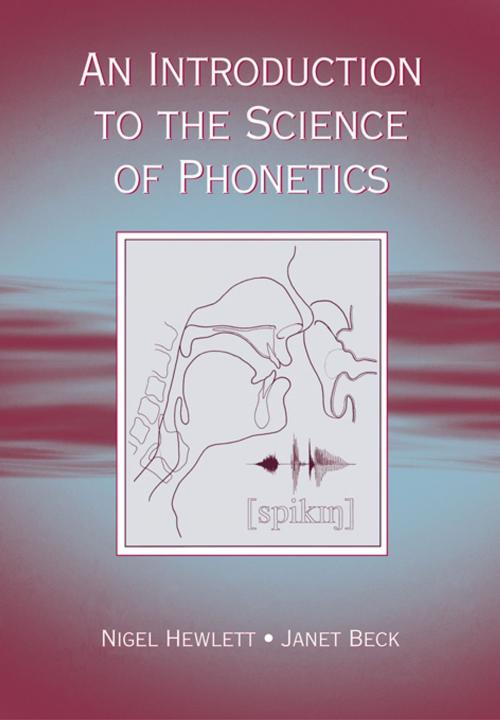An Introduction to the Science of Phonetics
Nonfiction, Reference & Language, Language Arts, Reading, Phonetics & Phonics, Linguistics| Author: | Nigel Hewlett, Janet Mackenzie Beck | ISBN: | 9781136500039 |
| Publisher: | Taylor and Francis | Publication: | April 3, 2013 |
| Imprint: | Routledge | Language: | English |
| Author: | Nigel Hewlett, Janet Mackenzie Beck |
| ISBN: | 9781136500039 |
| Publisher: | Taylor and Francis |
| Publication: | April 3, 2013 |
| Imprint: | Routledge |
| Language: | English |
The book is designed as an introduction to the scientific study of speech. No prior knowledge of phonetics is assumed. As far as mathematical knowlege is concerned, all that is assumed is a knowledge of simple arithmetic and as far as possible concepts are dealt with on an intuitive rather than mathematical level. The anatomical material is all fully explained and illustrated. The book is arranged in four parts. Part 1, Basic Principles, provides an introduction to established phonetic theory and to the principles of phonetic analysis and description, including phonetic transcription. Part 2, Acoustic Phonetics, considers the physical nature of speech sounds as they pass through the air between speaker and hearer. It includes sections on temporal measurement, fundamental frequency, spectra and spectrograms. Part 3, Auditory Phonetics, covers the anatomy of the ear and the perception of loudness, pitch and quality. The final part, Part 4, covers the articulatory production of speech, and shows how experimental techniques and tools can enhance our understanding of the complexities of speech production.
Though the audience for this book is mainly students and professors in the Speech Sciences, it will also be valuable to any students studying hearing science and acoustics. The book is well supported with figures, tables, and practice boxes with experiments.
The book is designed as an introduction to the scientific study of speech. No prior knowledge of phonetics is assumed. As far as mathematical knowlege is concerned, all that is assumed is a knowledge of simple arithmetic and as far as possible concepts are dealt with on an intuitive rather than mathematical level. The anatomical material is all fully explained and illustrated. The book is arranged in four parts. Part 1, Basic Principles, provides an introduction to established phonetic theory and to the principles of phonetic analysis and description, including phonetic transcription. Part 2, Acoustic Phonetics, considers the physical nature of speech sounds as they pass through the air between speaker and hearer. It includes sections on temporal measurement, fundamental frequency, spectra and spectrograms. Part 3, Auditory Phonetics, covers the anatomy of the ear and the perception of loudness, pitch and quality. The final part, Part 4, covers the articulatory production of speech, and shows how experimental techniques and tools can enhance our understanding of the complexities of speech production.
Though the audience for this book is mainly students and professors in the Speech Sciences, it will also be valuable to any students studying hearing science and acoustics. The book is well supported with figures, tables, and practice boxes with experiments.















